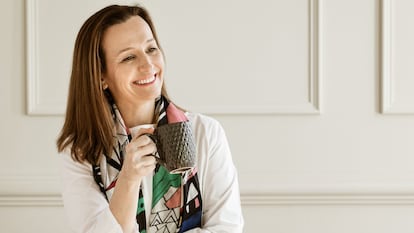Child psychologist Carmen Romero: ‘Mornings are usually the best time to keep a baby’s attention’
In her first book, the educator and sleep coach offers guidelines and activities for respectfully engaging in the physical, sensory and intellectual stimulation of infants

Carmen Romero is a child psychologist, expert in stimulation and early care, certified educator in positive discipline and infant sleep coach. She has an online and face-to-face practice in Barcelona, Spain. She trains professionals and gives workshops for parents all over Spain. She is a consultant for education and stimulation programs in early childhood education centers. Her social media pages serve as a reference on this subject; she has over 140,000 followers on Instagram alone. And Romero has just published her first book Cómo estimular a tu bebé (How to Stimulate Your Baby). In the book, she provides a friendly summary of the latest scientific knowledge about how babies’ and young children’s brains are formed and mature, so that parents and educators can help them cultivate all their talents.
Her book explains how to stimulate development, the role of genetics and the environment, what babies’ needs must be met in order for them to fully develop, basic learning in the early years and overstimulation. But, above all, she offers guidelines and activities for respectfully carrying out the three main types of stimulation (physical, sensory and intellectual), which form part of a program that the author has created and adapted based on her extensive professional experience.
Question. Are babies born needing stimulation, or do they stimulate themselves?
Answer. Babies are born with the need for stimulation. Nature is wise and offers a rich environment for them to stimulate themselves naturally. However, the environment is not always ideal. If the caregiver does not act with intention, what can happen is that the environment is less rich, and chance determines how to enhance the potential skills that, in theory, a baby has to develop. We are all born with the potential to develop. Based on our experiences and contact with the environment, the skills will develop to a greater or lesser extent. Let’s take music as an example. A child born with a gift for music must be exposed to a musical environment in which s/he can appreciate different sounds, stimulate auditory elements and have multiple pleasant experiences with instruments and musicians that will allow him or her to develop their potential. Otherwise, getting them to shine musically would be a miracle. Most likely, they would simply end up enjoying music without going much further.

Q. Are there any golden rules for properly stimulating babies?
A. Yes, of course. There are, and they are very important for successful stimulation activities. First of all, the baby must be receptive and eager, and want to enjoy the activity with the caregiver. In addition, we must adapt to the specific needs of each baby. One size does not fit all. Each child has their own rhythm, and we must consider their stage of development and what their needs are at the moment… The caregiver must also feel comfortable and at ease. Unfortunately, that is not always the case; daily rhythms can affect our desire to play and be active and positive with our children. The schedule and duration of activities is of the utmost importance for a child’s receptivity. We should always finish activities before the child asks us to stop. In addition, it is important to know that the best time for keeping a child’s attention is usually in the morning, after a good night’s sleep. We must not forget that before proceeding with such activities we must make sure that the baby is rested, clean and well-fed. Otherwise, it will be practically impossible to have a positive interaction.
Q. Can they be stimulated from the time they are newborns?
A. Babies receive natural stimulation from birth. Stimulation is necessary for survival purposes. Babies urgently need to know their new environment. A baby’s brain creates neuronal connections very rapidly, especially in the first year. Everything is new, everything interests them, and babies need to know such things to continue living in a safe environment. We must keep in mind that the brain is only built once, and that happens during the first years of life. Babies receive stimulation naturally throughout the day. Their senses are their main source of stimulation; because of their contact with the environment, they receive different stimuli. Stimulation should not be scheduled before the age of two or three months. We must respect the first stage of their life to facilitate their adaptation to a new world. The stimuli newborns receive naturally bombard them. Their parents’ voices and noises in their environment, lights and contrasts that they can visualize, the smell of their mother, of the milk and of the care products and contact are enough [stimulation]. However, it is important to know which aspects to promote and which to avoid in order to ensure their harmonious development. Contact with their caregivers will give way to strengthening emotional bonds, maintaining schedules, routines... From that point on, you can begin to introduce small daily exercises and activities for enhancing their proper development.
Q. Do babies who have older siblings develop their abilities earlier?
A. Without a doubt. Babies with older siblings have a much richer, more stimulating environment. There is natural play, movement, music, interactions. It is true that the child receives a lot of stimulation without the caregiver having to go out of their way. In contrast, when a first child comes home, the parents have little experience; they are very insecure, and it’s a much calmer and protective environment. It is not comparable to an environment where there are more children.
Q. What are the main questions parents ask in your practice?
A. Today’s parents are usually very well-educated and very well-informed… so they are also interested in their children developing in the best possible way. They want to know what their children need and which model they should follow for raising, educating and stimulating their children. The models we had in the past no longer serve us, which is why parents usually turn to professionals. The greatest difficulties that arise in my practice have to do with sleep, setting limits and managing tantrums. Knowing how to set the first limits is very difficult for them, and that’s why it is necessary to learn; it is not easy to do it without having a very clear methodology that allows you to do it positively and respectfully.
Q. What are some things about an infant’s behavior that raise red flags?
A. From birth, a baby’s development has what are called milestones, such as fixing their gaze at two months or four months, smiling on their own initiative to attract attention, among others. There are several of them, and they are reached during the first years of life. It is true that reaching these milestones involves some flexibility because each child has their own pace, each child is unique, each environment —the family, the culture, and so on — is different. But, broadly speaking, there are some important timeframes to consider, and they’re fulfilled one after another. We must consider those red flags, which give us a lot of information, and review them every 12 months. It’s not so much about worrying, but rather seeing which milestones have been achieved and which have not. And, if we see any problems, we can offer a program for appropriate stimulation, so that one day the child can reach the stars.
Sign up for our weekly newsletter to get more English-language news coverage from EL PAÍS USA Edition
Tu suscripción se está usando en otro dispositivo
¿Quieres añadir otro usuario a tu suscripción?
Si continúas leyendo en este dispositivo, no se podrá leer en el otro.
FlechaTu suscripción se está usando en otro dispositivo y solo puedes acceder a EL PAÍS desde un dispositivo a la vez.
Si quieres compartir tu cuenta, cambia tu suscripción a la modalidad Premium, así podrás añadir otro usuario. Cada uno accederá con su propia cuenta de email, lo que os permitirá personalizar vuestra experiencia en EL PAÍS.
¿Tienes una suscripción de empresa? Accede aquí para contratar más cuentas.
En el caso de no saber quién está usando tu cuenta, te recomendamos cambiar tu contraseña aquí.
Si decides continuar compartiendo tu cuenta, este mensaje se mostrará en tu dispositivo y en el de la otra persona que está usando tu cuenta de forma indefinida, afectando a tu experiencia de lectura. Puedes consultar aquí los términos y condiciones de la suscripción digital.








































